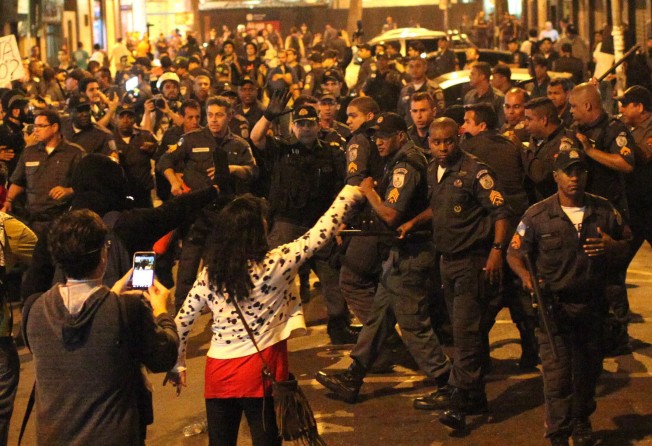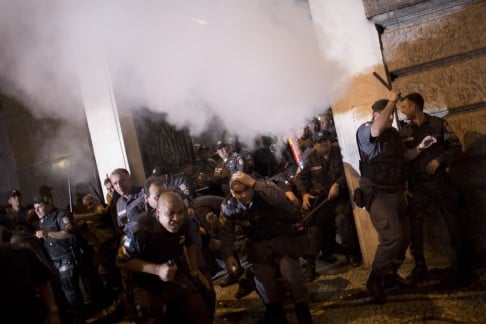Brazil’s social unrest easing but turning more radical
Radical groups are increasingly resorting to violence

The massive street demonstrations that roiled Brazil last month have eased but more radical groups are coming to the fore and resorting to violence.
Late on Tuesday, police used tear gas, rubber bullets and stun grenades to disperse about 50 extremists who went on the rampage in Sao Paulo, ransacking banks and other businesses.
The violence followed a peaceful rally by 300 people who railed against Sao Paulo Governor Geraldo Alckmin and expressed solidarity with Rio protesters seeking the impeachment of Governor Sergio Cabral accused of corruption and arrogance.
The Sao Paulo protest, called via social media networks by the anarchist Black bloc group, also demanded the demilitarization of the state military police accused of excessive brutality.
Last Friday, 10 bank branches were also ransacked by radicals in central Sao Paulo while in Rio around 200 protesters marched to within a few metres of a Copacabana beach stage where visiting Pope Francis was wrapping up a massive ceremony with hundreds of thousands of young Catholics.
The Rio demonstrators slammed the public money spent on the papal visit.
Wednesday, a new demonstration called by Black bloc against Cabral and police repression was scheduled in central Rio.
The next day, another protest was to take place in the biggest shantytown in Rio’s tourist area, Rocinha, where 42-year-old construction worker Amarildo de Souza has been missing for two weeks after he was picked up by police.
“Where is Amarildo? is a chant frequently heard in recent protests.
In Rio, where Cabral has become the country’s most unpopular governor despite making several concessions, turmoil rages on.
Last month, more than one million Brazilians took the streets across the country to demand better public services and an end to endemic corruption
“It is as if a small fire has been smoldering since the big protests in June, until a new issue capable of generating mass mobilization emerges,” said Michel Misse, an expert on violence at the Rio de Janeiro Federal University .
Last month, more than one million Brazilians took the streets across the country to demand better public services and an end to endemic corruption. They also railed against the high cost of hosting next year’s World Cup.
The unrest began in Sao Paulo with young militants demanding a rollback of public transport fare hikes, a call picked up in several other major cities. The fare increases were subsequently cancelled.
“What unites these young people is a rejection of conventional policies. But today, the demonstrations are on a smaller scale and carried out by students strongly opposed to Cabral,” Misse said.
They want explanations on “the repressive tactics used by the state military police that answers to Cabral,” he added.

“Today’s demonstrations echo the unease the population feels toward the ruling elite in the country, but they are staged by radicalised youths,” he said.
The two experts see the current situation as “new, surprising and difficult to interpret.”
They attribute it to a new role played by social media networks.
“No one has yet taken the full measure of this development. There is no organised leadership,” according to Rodrigues.
The experts believe the political impact of these protests will only be measured during the October next year national elections.